Have you ever wondered what some of the most common words used in poetry are? Of course, some poets are known for writing about certain themes, but are there any surprising words that feature throughout? And, just how have these words changed over time? Are there any glaring differences when comparing classic poems with contemporary poems submitted through our community platform? This is what we sought to find out at My Poetic Side. We analyzed our entire database, which contains more than 35,000 poems, to discover the most common words in poetry, not only generally but in relation to some of the most famous poets as well. In the process, we created fun sliding images for 9 of the most important authors + a final general comparison. We only applied a few stop words which were filtered out before processing data, such as “a”, “the”, “and”, “of” and “to”, that would have skewed results. Also, we gave a little boost in the algorithm to words included in titles because of their importance.
Read on to discover what we found. And make sure to place your mouse pointer over the images to reveal the authors pictures and their favorite words, or alternatively if you are on your mobile, click inside the images.
Maya Angelou
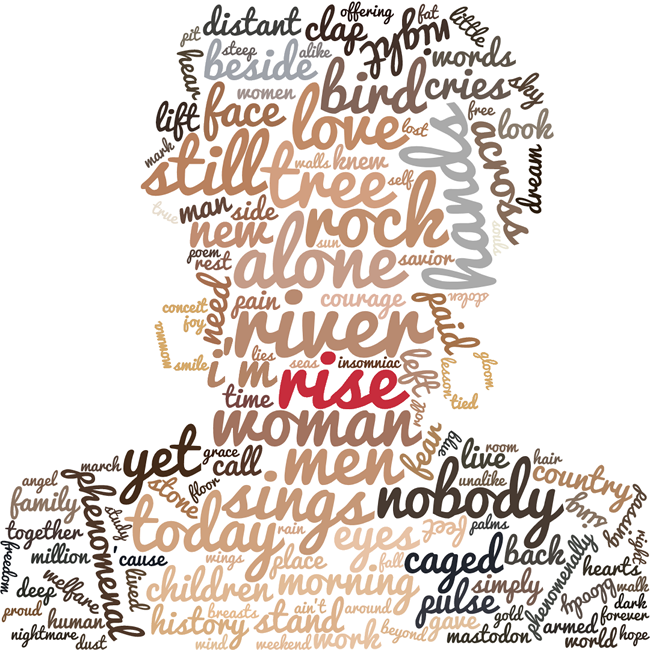
As a highly respected spokesperson for Black people and women, it is hardly surprising that one of Maya Angelou’s most used word was ‘rise’. Her poems have been called the anthems of African Americans. This is evident from words such as ‘history’, ‘pain’, ‘caged’, and ‘fear’, as well as empowering words, such as ‘stand’, ‘free’ and ‘courage’. The heavy use of ‘river’, ‘bird’, ‘sings’, and ‘sun’ can also be viewed as symbols of freedom. Her poem ‘Caged Bird’ is one of the most well known, telling the story of a free bird that leaps on the wind’s back and floats downstream. Aside from racism, discrimination and equality, other common themes included identity, struggle, music, painful loss, love and family. It is thus of little wonder that the words ‘children’, ‘work’, ‘love’, ‘men’, and ‘woman’ are frequently used in her poems.
Robert Frost
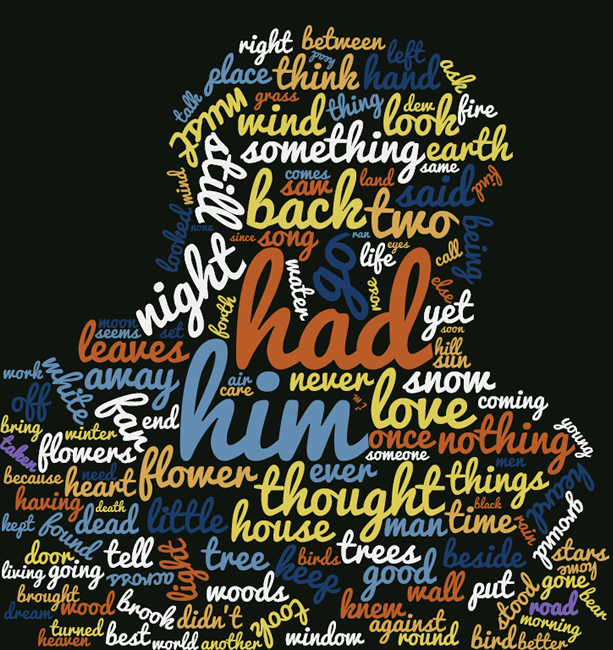
Robert Frost is highly regarded for his command of American colloquial speech and his realistic depictions of rural life. Consequently, it comes of little surprise that some of his most commonly used words relating to nature and outdoor life, including ‘tree’, ‘trees’, ‘flowers’, ‘wind’, ‘leaves’, ‘birds’, and ‘wood’. What is perhaps more curious is the element of nostalgia and reflection on the past that seems to be very prominent through the use of ‘had’, ‘back’, ‘dead’, and ‘thought’. The words ‘go’, ‘nothing’, ‘away’, and ‘death’ speak of the theme of isolation, which was common throughout a lot of Robert Frost’s poems. The two most frequently used words in Frost’s poems are ‘had’ and ‘him’, and while the former can be related to the theme of isolation, it could simply be more straightforward than this. His poems always dealt with man in relation with the universe. This is the perspective they came from, which is no doubt why those words were so prominent.
Emily Dickinson
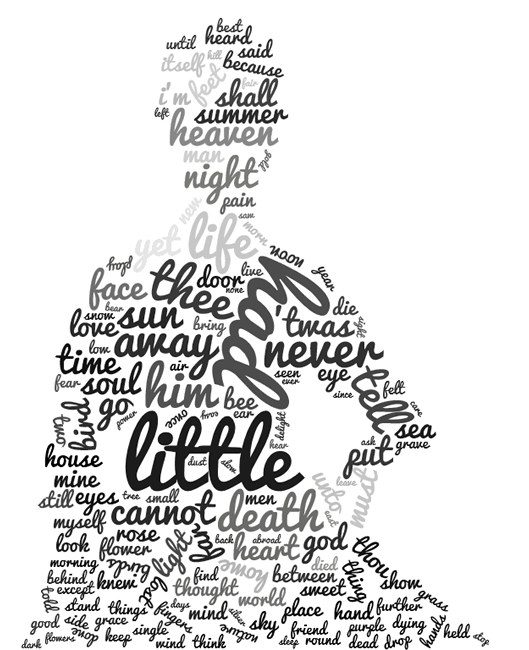
Some of the most commonly used words in Emily Dickinson’s poems are simply indicative of the period of time she wrote in. She was born in 1830 and died in 1886, and thus the excessive use of the words ‘thee’, ‘thou’, and ‘twas’ is something that can simply be related to the times. However, other words used by her are a lot more telling in regards to her thoughts and the place she was coming from while writing. She often used images from nature and commented on the wonders of it, hence the regular use of ‘flower’, ‘sun’, ‘summer’ and ‘sky’. Her use of ‘heaven’ and ‘God’ stands out, which is not a shocker when you consider that a lot of her work was devoted to exploring the relationship between an individual and a Judeo-Christian God. ‘Death’ is another word that has been frequently used, as she often explored death and immortality. The word ‘feet’ is also prominent, which Dickinson often used as a symbol to comment on life journeys. Perhaps ‘little’ being her most commonly used word is the most intriguing.
Edgar Allan Poe
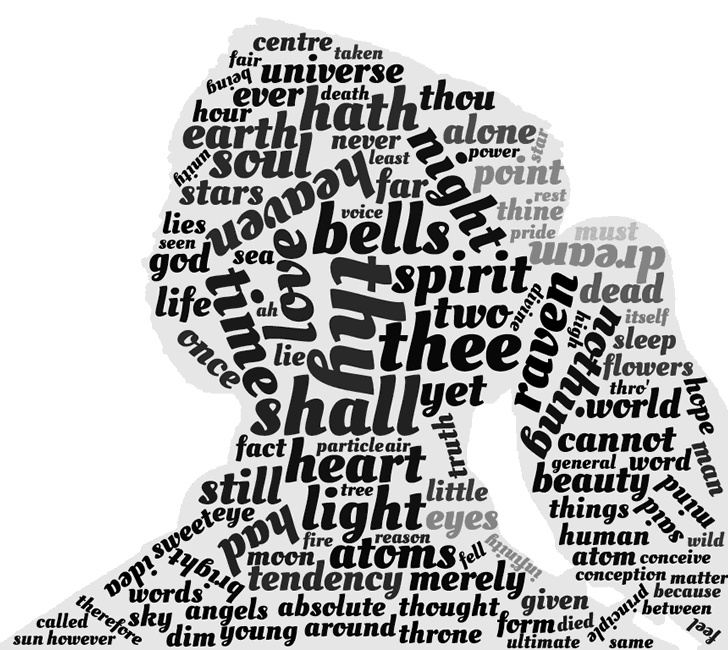
When it comes to Edgar Allan Poe, you’d expect ‘raven’ to be one of the standout words, after all this was the title and topic of one of his most famous works. In fact, animals in general were used as motifs throughout his poems. ‘Eyes’ is another word that has been used in a lot of Poe’s works. This is because he used it to symbolize the essence of human identity, which cannot be separated from the body. One common theme in Poe’s poems is love and hate, which is evident from his regular use of ‘heart’, ‘death’, ‘love’, and ‘angels’. Another prominent theme of Poe’s work is the power of the dead over the living. In his poems he keeps the power of the dead alive through memory, which is no doubt why words such as ‘dead’, ‘dream’, ‘life’, ‘angels’, ‘stars’, and ‘soul’ are used regularly.
Langston Hughes
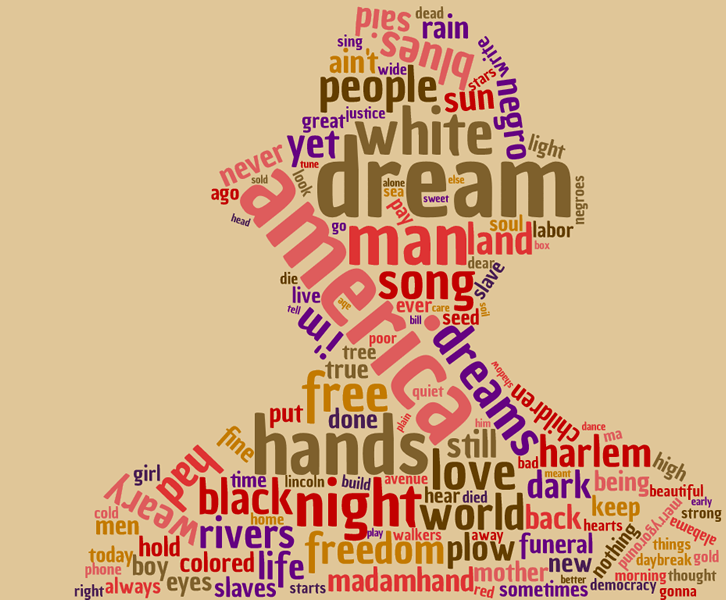
A lot of Langston Hughes works center on The American Dream. He speaks for those suffering poverty, oppression, and prejudice, yet is hopeful that one day they will be able to pursue their dreams. This is patently obvious from the words he uses the most, i.e. ‘America’, ‘dream’, ‘white’, ‘dreams’, ‘freedom’, ‘black’, ‘slaves’, and ‘negro’. Music is also a common theme in his poems. In fact, a lot of his work has a beat or rhythm that is identifiable. They read like they are verses from a blues or jazz song. He also addresses the topic of music, which is why words such as ‘blue’, ‘dance’, and ‘song’ are used. He alludes to wisdom throughout, although he does not specifically use the word. Instead, words such as ‘ma’ and ‘boy’ illustrate this, as he often speaks of the words of the wisdom a mother gives to her son.
Sylvia Plath
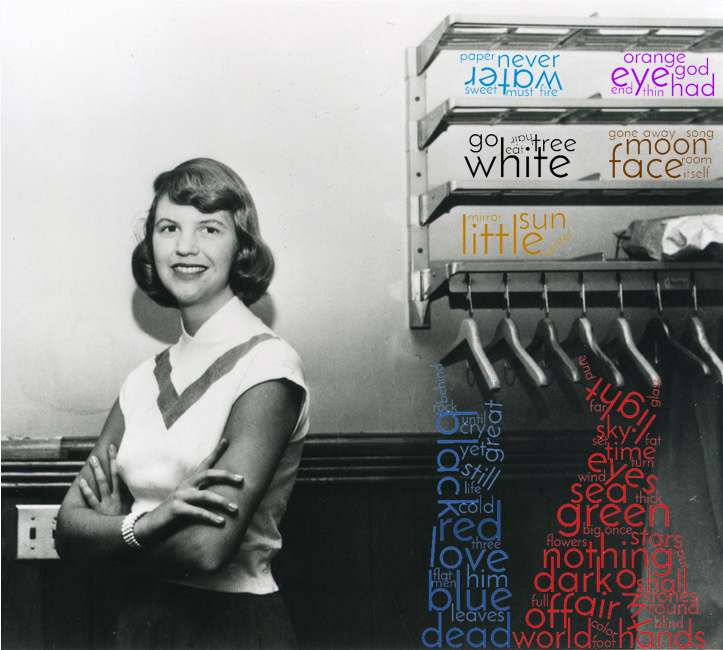
Anyone who is familiar with Sylvia Plath’s work will know that death is an ever-present reality throughout. From suicide to the void left by her father’s death, there are many ways she addresses this. You can see this theme from the words she uses, for example, ‘black’, ‘him’, ‘dead’, ‘nothing’, go’, and ‘gone’. Despite this most tragic theme, she uses nature as a provoker – this is the only thing that makes Plath not give up. Thus, although a lot of Plath’s poems are dark, there are a lot of words that we’d immediately associate with positivity, such as ‘orange’, ‘sun’, ‘sky’, ‘great’, and ‘sweet’. A lot of this stems from her allusions to nature. She also regularly discussed patriarchy, as she lived in a time when there were very strict gender norms. Words such as ‘him’, ‘men’, ‘nothing’ and ‘fat’ allude to this, with the latter no doubt used because she often revealed her disappointment with pregnancy.
Walt Whitman
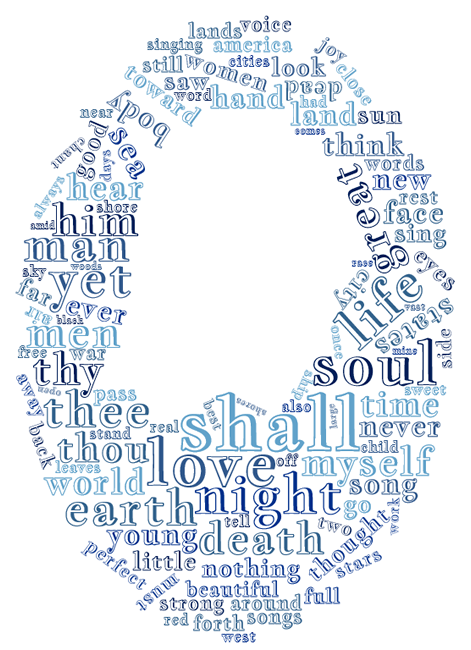
Walt Whitman often discussed democracy in his works, pondering whether it could thrive as a political system and if the US could survive as a country. This is where words such as ‘America’, ‘new’, ‘states’, ‘cities’, and ‘strong’ come from. The human body is a motif throughout his works, where he depicts the human body and its capacity for physical contact. This is where words such as ‘face’, ‘eyes’, ‘hand’, and ‘body’ come from. ‘War’ is also a word that is used throughout, as Whitman spoke about the Civil War, using it to discuss the cycle of growth and death. He often focuses on the life cycles of individuals, which is why common words in his poems include ‘life’, ‘new’, ‘dead’, ‘young’, and ‘little’. And, finally, some words such as ‘shall’, ‘thou’ and and ‘thy’ simply stem from the period in time in which he wrote, as Whitman was born in 1819 and died in 1892.
William Blake
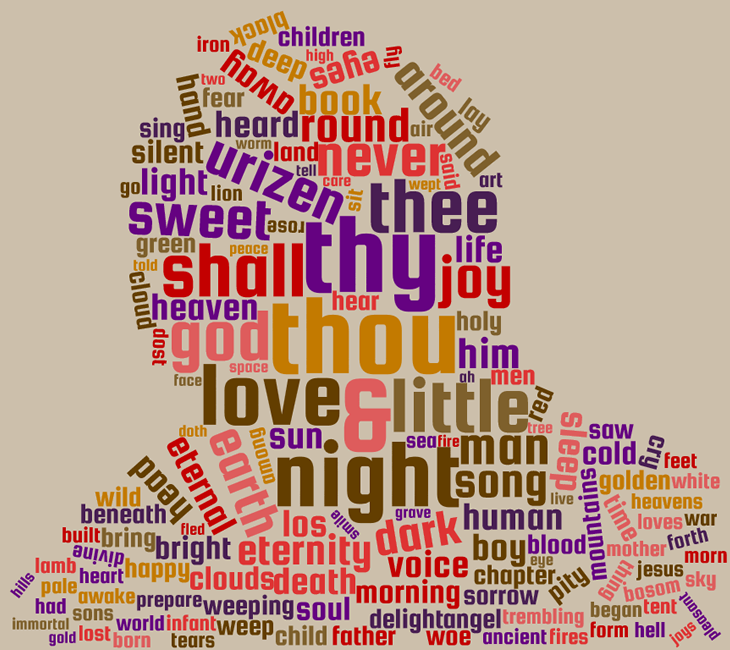
William Blake believed that balance was achieved through opposition, which is why there are a lot of opposite words used throughout his work – both ‘life’ and ‘death’, ‘morning’ and ‘night’, ‘light’ and ‘dark’ are used in large amounts. Religion was a common theme throughout Blake’s work, although it is somewhat unclear regarding where Blake stood in terms of his religion. Some people believe he was agnostic, others think he was an atheist. Either way, there is no denying this was something he addressed, with words such as ‘Jesus’, ‘heavens’, ‘heaven’, and ‘God’. One word that stands out from the most regularly used is ‘Urizen’, which is a word that was invented as part of his complex mythology, representing the embodiment of law and conventional reason.
William Shakespeare
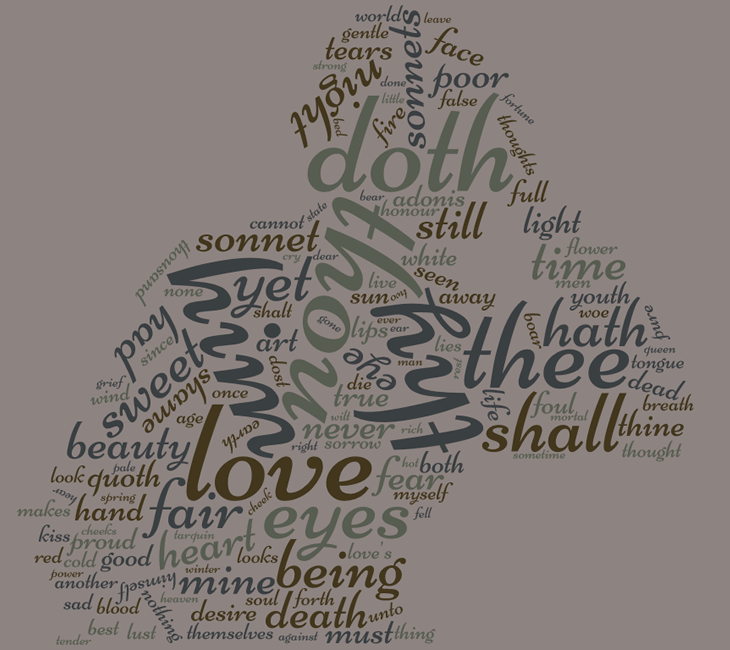
William Shakespeare’s poems, or should we say sonnets, often explored the dangers of lust and love. He explored the painful physical and emotional consequences that could come from it, which is why we see a regular use of ‘desire’, ‘lust’, ‘beauty’, ‘kiss’, ‘Adonis’, and, of course, one of his most regularly used words – ‘love’. You will also notice the frequent use of ‘flower’, which is no doubt because he used flowers as a symbol of beauty, the aging process, the transience of life, and the passage of time. Other notable words include ‘spring’, ‘wind’, and ‘sun’. This is because Shakespeare often used the seasons and the weather to stand for human emotions. Beauty was explored in depth, including the responsibilities of being beautiful and real beauty vs. clichéd beauty, which is why words such as ‘beauty’, ‘looks’, ‘fair’, and ‘face’ are often used.
Classic poems VS. Contemporary poems
Finally, we have compared classic poems with contemporary poems submitted by our own users here at My Poetic Side’s community, to see whether there are any similarities and stark differences as time has passed. Comparing thousands of poems, one thing that has become common is that the use of the following words has never faded – ‘never’ and ‘had’, revealing that we often refer to things we cannot attain or have lost. ‘Eyes’ is another word used in poems from both periods, as poets often talk through what they see. However, while ‘beauty’ seems to be a theme of classic poems, it seems to have been replaced with ‘love’. ‘Mine’ is a word frequently used in classic poems while this seems to have been replaced with ‘want’ in more regular works, signifying our change from discussing what’s ours to what we desire. Perhaps we’ve moved to a period of never being satisfied?

Embed code – Share this on your site
You can have these sliding images on your website. Choose a writer from the dropdown menu, and copy the code that will display in the text field below it. Paste it on your blog/website.


Comments2
So cool! Thank you.
This struck me as a little silly, till I made a guessing game of it for each poet. I tried to guess the top 10 words for each one. Got more than a few right. Eyes for Shakespeare of course. Soul and Life for Whitman were a given. God for Blake. Death for poor Dickinson. Such fun...
You must register to comment. Log in or Register.